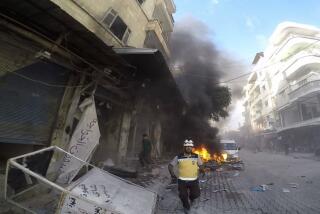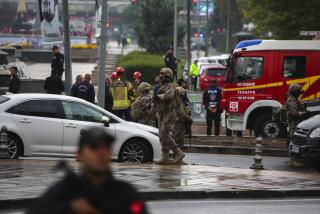Syrian leader seeks to calm Kurdish unrest
Syrian President Bashar Assad made new concessions Thursday to the country’s minority Kurdish population after some members joined pro-democracy demonstrators, threatening to create a new flank in Assad’s political crisis.
The government said it would grant citizenship to hundreds of thousands of Kurds in the northeast who have been counted as illegal immigrants since a controversial census in 1962. That left them unable to secure public sector jobs, passports and other basic citizenship rights.
Kurds in the northeast demonstrated last Friday calling for citizenship, economic relief and the release of political prisoners.
On Tuesday, the government released 48 Kurdish political prisoners who had been held for a year, a Syrian human rights group said Thursday.
“What the regime is doing is a positive step toward the Kurds,” said Sherkoh Abbas, a Kurdish human rights activist who also expressed solidarity with the larger pro-democracy movement. “Of course, all Syrians should be part of this process.”
Meanwhile, the larger protest movement approached a potentially pivotal moment as organizers planned for renewed demonstrations despite an intense security crackdown that has left their ranks in the streets diminished.
Human rights activists cautioned that despite heightened hopes after the revolutions in Tunisia and Egypt, even the most optimistic advocates did not believe the Assad family’s four-decade rule in Syria would come to a swift end.
“Syria’s diversity and the decimated state of its civil society … create a different set of conditions that will make the pace of progress of the revolution not necessarily slow, but episodic,” said Ammar Abdulhamid, a prominent Syrian human rights activist living in the United States.
Scattered protests were reported throughout the country Thursday — the 64th anniversary of the formation of the Baath Party, which has been in power here since 1963 — and larger demonstrations were expected Friday.
“All of Damascus’ suburbs have caught the bug: to the north, At Tall; to the east, Kafar Batna, Duma, Harasta and Saqba; to the west, Mouaddamiyyah; and to the south, Kisweh,” Abdulhamid said. “What has long been known as the Poverty Belt is now the Revolution Belt.”
Some protests near the capital have focused on sectarian issues while others have pressed the religious agenda of conservative Sunni Muslims.
In response, state media reported this week that the government would close a controversial casino. It also announced the rehiring of schoolteachers dismissed last year for wearing a niqab, the veil that covers the entire face except the eyes.
Protests in other parts of the country — including the epicenter of Dara in the south, and Homs in the west —have focused on economic deprivation and government corruption.
The governor of Dara was dismissed several weeks ago, and state media reported Thursday the firing of the governor in Homs, a close friend of Assad.
“But the most important thing right now is the assurance of the right of the peaceful demonstration,” said Radwan Ziadeh, a Syrian human rights advocate who teaches at George Washington University. “It’s clear that Bashar Assad can’t allow it.”
Times staff writer Therolf reported from Cairo and special correspondent Sandels from Beirut.
More to Read
Start your day right
Sign up for Essential California for news, features and recommendations from the L.A. Times and beyond in your inbox six days a week.
You may occasionally receive promotional content from the Los Angeles Times.







